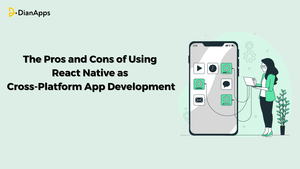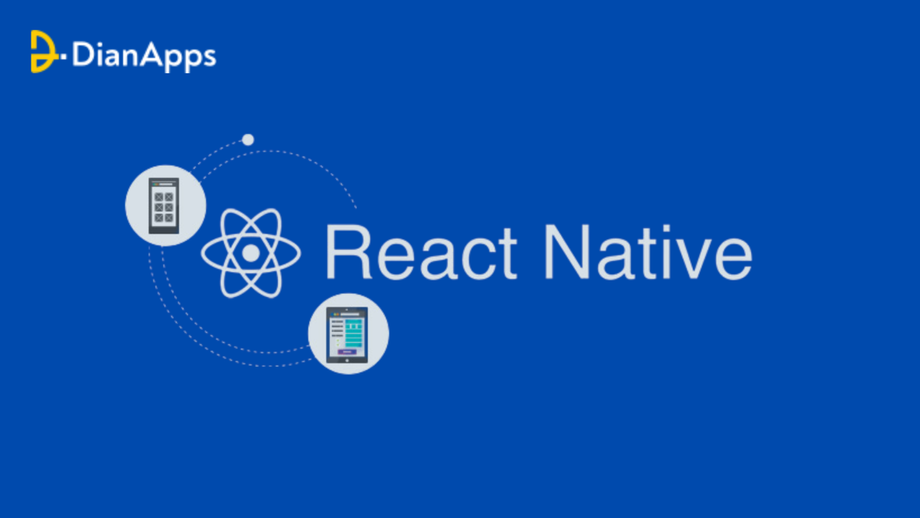More from DianApps Technologies
More in Politics
Related Blogs
Archives
Social Share
The Pros and Cons of Using React Native as Cross-Platform App Development
Body
React Native has been acknowledged as the most favored cross-platform solution for the building of both Android and iOS apps, respectively. Cross-platform app development seems to have propelled businesses and developers to a considerable level. You can design apps for two separate operating systems using React Native on a single platform.
JavaScript may be used to construct native mobile apps using React Native, an open-source framework created by Facebook. React Native app development allows you to create apps in a manner comparable to that of Objective-C or Swift for iOS and Java or Kotlin for Android.
Although React Native is a popular option, it isn't the greatest one because it also has some drawbacks.
In order for you to understand when to use and when to avoid the platform, we will be emphasizing the main benefits and drawbacks of developing React Native apps.
The Advantages of React Native App Development
1. Known for Optimal Performance
Undoubtedly, using native control and modules to boost efficiency is possible with React Native app development services.
React Native generates code directly and freely for the native APIs and connects to the native components for both operating systems.
Now that it uses a distinct thread from the UI and the native APIs, the performance has improved. You have other options as well, such as choosing the WebView, however, the performance level will suffer.
2. Can Reuse the Codes and Pre-Developed Components
The ability to reuse code is among the main advantages of using React Native. Because they don't need to create a mobile app specifically for each platform, the developers feel fortunate and grateful to Facebook.
In actuality, you incorporate 90% of the native foundation to allow for code reuse across both OS. Because of this distinctive feature, React Native app developers frequently save a significant amount of time and money during the app development process.
The fact that you can use web application code that was created in React to create a mobile app is even more satisfying to note.
Due to the availability of pre-built components in the open-source framework, React Native also speeds up development.
It simply implies that the codes have already been developed and that you must implement them in accordance with the needs of the app. You may use it at your discretion.
3. Live and Hot Reloading
Live and Hot Reloading capability is a hallmark of React Native mobile app development. Avoid confusion because these are two distinct aspects.
When it comes to Live Reloading, a tool is used to compile and read the file in which the developer performed the modifications. Additionally, it presents a fresh file to the stimulator, starting the software from scratch.
The Hot Reloading was developed following the initial reloading procedure and is based on the Hot Module Replacement (HMR). The most important factor is present when storing the changes, even though there isn't much difference between the functions and features.
Even if the program is still running, the HMR intermediary will place the changed files in the designated location. Hot Reading's main benefit is that it enables source code editing; as a result, you don't need to recompile the app to view the codes.
As a result, if you have several windows open, such as the code window and the app screen window, you will be able to see the results of your changes to the code immediately. In actuality, Hot Reloading is essential for lowering the wait time for modifications.
4. Offers Simple User Interface
React Native app development is more commonly referred to as an open-source JavaScript library than a framework because it also provides a condensed mobile user interface.
It's crucial to get the sequence right if you have created the perfect app and React Native is the best option for doing so. It speeds up loading and provides a more responsive UI design.
5. Offers More Stable Apps
Data binding is made easier using React Native, which is one of its features or advantages. This component contributes to the increased stability and dependability of your programmes.
The parent data is not affected in any way by the child element. React Native only permits updating of components that are allowed to be updated; if you need to make any modifications, you must edit and apply the updates.
Cons of React Native App Development
We have talked about the benefits of React Native and why it is a preferred option for developers.
Without becoming prejudiced, we must also consider the other side of the argument. Yes, let's now concentrate on some of its main drawbacks:
1. React Native is a Young and Immature technology.
In comparison to other programming languages for Android and iOS, React Native is a newcomer. It is still in the development stage, which may be detrimental to the apps.
- The frequent update releases, which can occasionally be perplexing for developers, are one of the areas where it needs more consistency. This is because the developers have to perform numerous adjustments and continuous updates each time a new update is launched. The popular app Airbnb encountered numerous issues while being upgraded.
- Second, in addition to creating the codes, developers occasionally need to write additional native code for components that are incompatible with React Native.
- React Native app development components occasionally perform worse than native components. The integration of the lengthy, enormous list with React Native is challenging.
2. Learning the Rope is a Tough Ask
React Native can be a difficult rope to learn, particularly if you are just starting in the realm of app development.
This is because the JavaScript syntax extension contains JSX, which allows HTML elements to be used with JavaScript. Comparatively speaking to other cross-platform programmes, it won't be all that much simpler for the ordinary learner.
3. It is Not Security-Resistant.
We are aware that React Native is an open-source framework and JavaScript library, which leaves a security robustness gap.
However, there are situations when you need to add more protection, particularly if you're developing banking and financial apps with extremely personal data. Therefore, experts advise against using React Native app development services in those circumstances.
4. Initialization Takes More Time
The issue with React Native is that it takes a long time for the runtime to initialise, even on high-tech devices and gadgets, before it can be first rendered.
This is once more a result of the lengthy initialization time of the JavaScript thread.
5. Memory Management
Once again, JavaScript is to blame for React Native's inability to handle the computational demands of heavy apps.
The inefficient way that floats computations are handled makes it challenging to control memory and use.
Conclusion
In summarising React Native's benefits and drawbacks, we would state that it is an extremely practical framework and well-known for its methods for saving money and time.
It provides the benefits of a big community base, hot reloading, and stable programs, as well as allowing React Native mobile app developers to reuse the codes and modules.
However, there are some drawbacks as well, and one of them is that it is still new and in the development stage, which works against it. Due to the JavaScript toolkit's limitations in terms of security, developers may experience difficulties.
However, recently, Facebook has changed its licencing policy to MIT License and thus there’s a chance that it will get better and better in the future.
Article Source:- https://techplanet.today/post/the-pros-and-cons-of-using-react-native-as-cross-platform-app-developmen













Comments